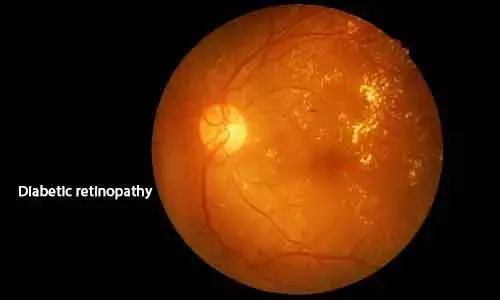- Home
- Medical news & Guidelines
- Anesthesiology
- Cardiology and CTVS
- Critical Care
- Dentistry
- Dermatology
- Diabetes and Endocrinology
- ENT
- Gastroenterology
- Medicine
- Nephrology
- Neurology
- Obstretics-Gynaecology
- Oncology
- Ophthalmology
- Orthopaedics
- Pediatrics-Neonatology
- Psychiatry
- Pulmonology
- Radiology
- Surgery
- Urology
- Laboratory Medicine
- Diet
- Nursing
- Paramedical
- Physiotherapy
- Health news
- Fact Check
- Bone Health Fact Check
- Brain Health Fact Check
- Cancer Related Fact Check
- Child Care Fact Check
- Dental and oral health fact check
- Diabetes and metabolic health fact check
- Diet and Nutrition Fact Check
- Eye and ENT Care Fact Check
- Fitness fact check
- Gut health fact check
- Heart health fact check
- Kidney health fact check
- Medical education fact check
- Men's health fact check
- Respiratory fact check
- Skin and hair care fact check
- Vaccine and Immunization fact check
- Women's health fact check
- AYUSH
- State News
- Andaman and Nicobar Islands
- Andhra Pradesh
- Arunachal Pradesh
- Assam
- Bihar
- Chandigarh
- Chattisgarh
- Dadra and Nagar Haveli
- Daman and Diu
- Delhi
- Goa
- Gujarat
- Haryana
- Himachal Pradesh
- Jammu & Kashmir
- Jharkhand
- Karnataka
- Kerala
- Ladakh
- Lakshadweep
- Madhya Pradesh
- Maharashtra
- Manipur
- Meghalaya
- Mizoram
- Nagaland
- Odisha
- Puducherry
- Punjab
- Rajasthan
- Sikkim
- Tamil Nadu
- Telangana
- Tripura
- Uttar Pradesh
- Uttrakhand
- West Bengal
- Medical Education
- Industry
Researchers identify potential treatment for early diabetic retinopathy

Philadelphia –Researchers have identified a potential treatment candidate for early diabetic retinopathy which has anti inflammatory and neuroprotective effects.Research has been published in the American Journal of Pathology.
Diabetic retinopathy is one of the main vascular complications of type 2 diabetes, and the most common cause of visual deterioration in adults. The research reports on the efficacy of a possible treatment candidate that showed anti-inflammatory and neuroprotective effects on the retina and optic nerve head in early type 2 diabetic retinopathy using a diabetic mouse model.
Diabetic retinopathy is caused by damage to the blood vessels of the light-sensitive tissue at the back of the eye. The cause is usually attributed to high blood sugar (hyperglycemia), but several studies have shown that inflammation is also an important factor in the progression of the disorder.
"Inflammation causes neurodegeneration as well as microvascular abnormalities in the retina," explained lead investigator Jin A. Choi, PhD, Department of Ophthalmology and Visual Science, St. Vincent's Hospital, College of Medicine, The Catholic University of Korea, Seoul, Republic of Korea. "Diabetic retinal neurodegeneration can occur before the onset of clinical diabetic retinal microvascular abnormalities. Therefore, therapeutics for neurodegeneration may provide a novel interventional strategy in the window period between the diagnosis of type 2 diabetes and the onset of clinically manifested diabetic retinopathy."
Investigators analyzed and compared the anti-inflammatory and neuroprotective effects of the glucagon-like peptide-1 receptor agonist (GLP-1RA) lixisenatide in the retina and the optic nerve head with those of insulin in a mouse model of type 2 diabetes. They divided diabetic mice into three groups; GLP-1RA (LIX); insulin (INS) with controlled hyperglycemia based on the glucose concentration of LIX; and a control group (D-CON). Nondiabetic control mice were also characterized for comparison.
After eight weeks of treatment, neuroinflammation caused by type 2 diabetes was significantly reduced in GLP-1RA–treated retinas and optic nerve heads compared with untreated or even insulin-treated retinas of early type 2 diabetic mice, showing that the outcomes are independent of the glucose-lowering effect of GLP-1RA.
"This study can provide a possible therapeutic strategy to prevent visual deterioration by using GLP-1RA in early type 2 diabetic retinopathy," noted first author Yeon Woong Chung, MD, Department of Ophthalmology and Visual Science, St. Vincent's Hospital, College of Medicine, The Catholic University of Korea, Seoul, Republic of Korea. "GLP-1RA significantly suppressed neuroinflammation in the early diabetic retinopathy, whereas insulin had little or no suppressive effect in this study."
"Retinal ganglion cells start to die even before clinical changes such as hemorrhages in diabetic retinopathy occur," commented Dr. Choi. "Thus, for better visual prognosis, we need to focus on the treatment of the retina in early type 2 diabetes before the clinical onset of diabetic retinopathy. The diabetic mouse group in our study who were treated with GLP-1RA showed significantly decreased cell death compared to those with insulin treatment."
For more details click on the link: https://doi.org/10.1016/j.ajpath.2020.01.011
Hina Zahid Joined Medical Dialogue in 2017 with a passion to work as a Reporter. She coordinates with various national and international journals and association and covers all the stories related to Medical guidelines, Medical Journals, rare medical surgeries as well as all the updates in the medical field. Email: editorial@medicaldialogues.in. Contact no. 011-43720751
Dr Kamal Kant Kohli-MBBS, DTCD- a chest specialist with more than 30 years of practice and a flair for writing clinical articles, Dr Kamal Kant Kohli joined Medical Dialogues as a Chief Editor of Medical News. Besides writing articles, as an editor, he proofreads and verifies all the medical content published on Medical Dialogues including those coming from journals, studies,medical conferences,guidelines etc. Email: drkohli@medicaldialogues.in. Contact no. 011-43720751


